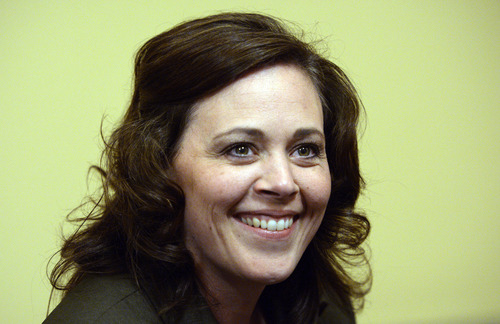This is an archived article that was published on sltrib.com in 2014, and information in the article may be outdated. It is provided only for personal research purposes and may not be reprinted.
Proposed increases on gasoline tax and property tax were declared dead Monday by House Speaker Becky Lockhart.
"They won't be heard on the House floor," she told reporters, even though bills to raise those taxes have passed the Senate.
That comes, in part, because Lockhart's $200 million initiative to improve technology was killed in budget negotiations. She said she viewed the tax increases as attempts by the Senate to fund her initiative without forcing cuts elsewhere.
So with her initiative now dead after budget negotiations, she made clear that the tax hike proposals are also dead.
The Senate had passed SB60, by Sen. John Valentine, R-Orem, to change how Utah's gasoline tax is calculated, so it would rise if gasoline prices increase in the future. It also had a built-in floor so they could not fall below current levels.
The current gasoline tax is 24.5 cents per gallon and has not gone up since 1997.
Valentine's measure would keep 14 cents a gallon as a base. The rest would be determined by multiplying 3.69 percent and the previous year's average price per gallon of gasoline before state and federal taxes are added.
Valentine said the calculations were designed to keep taxes flat for the first year but let them rise thereafter as gasoline prices increase. In the bill's current form, Valentine said that for every $1 bump in the price of gasoline, a driver who averages 12,000 miles a year would pay an extra $18 in tax annually.
A long parade of local officials, state highway officials and businesses had supported the move, saying Utah and local governments have been falling behind in their ability to maintain roads because the gas tax has not been raised in 17 years.
Also, the Senate had passed SB111 by Sen. Aaron Osmond, R-South Jordan, to raise property taxes.
His bill originally proposed the plan to even out revenue for rich and poor school districts by freezing a state property tax rate — known as the minimum basic tax rate. Currently, that rate goes down as property values rise. Keeping the rate constant would allow more money to be collected as property values rise.
Fiscal analysts predict that would raise $12 million the first year, $41 million the second year, rising eventually to $100 million a year — where it would have been kept to equalize funding.
Senators amended the bill to direct the money to Lockhart's education technology initiative, but she quickly spoke out against a tax hike.



